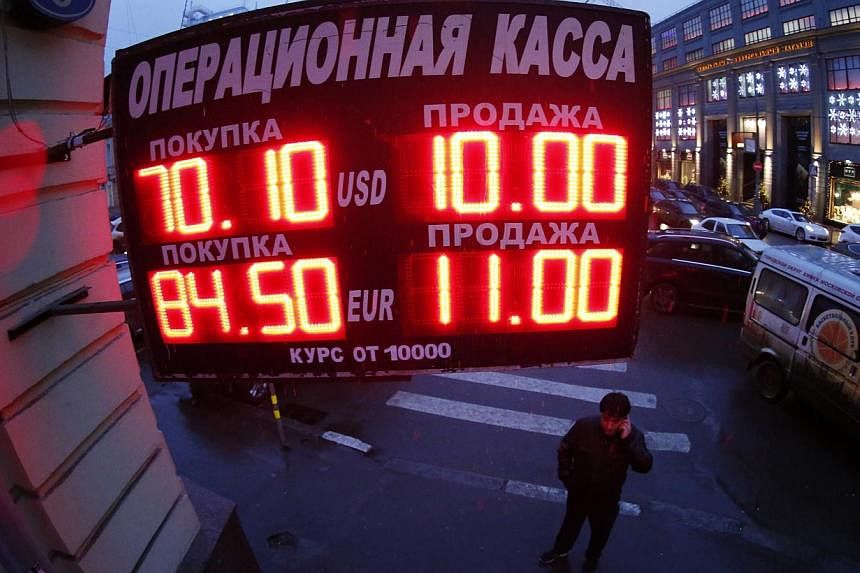SYDNEY (REUTERS) - World markets braced for more volatility on Wednesday as tumbling oil prices and a brewing financial crisis in Russia sent investors stampeding for safe havens such as the yen and US Treasuries.
The jump in the yen is likely to pressure Japan's Nikkei, while fears of capital flight will haunt emerging markets across Asia. MSCI's index of Asia-Pacific shares outside Japan is already at nine-month lows.
In currency markets, the Russian rouble crashed back to earth after an emergency hike in interest rates provided only fleeting support. It was quoted around 68.00 to the US dollar having been as far as 80.00 at one stage.
Three retail trading platforms halted trading in the currency as speculation mounted that Moscow will impose capital controls within the next few days.
A year-end dearth of liquidity was leading to wild moves in even the most staid of assets.
"The combination of the rouble crisis and poor liquidity broadly resulted in a period of total dysfunction across global FX and rate markets on Tuesday," reported analysts at Citi. "Most of these extreme moves began to unwind after the NY open but memories of the fallouts kept traders on the edge of their seats all session."
The oil-exposed Norwegian krone, for instance, hit an all-time low by one measure after carving out the widest daily trading range since the global financial crisis.
The rush to close positions caused collateral damage to the US dollar as investors had been very long of the currency in anticipation of further gains.
The dollar retreated to 116.60 yen from atop 118.00 on Tuesday, while the euro vaulted three quarters of a cent to US$1.2511.
On Wall Street, the Dow shed early gains to end Tuesday down 0.65 per cent, while the S&P 500 lost 0.85 percent and the Nasdaq 1.24 per cent.
Brent oil lost US$1.31 to US$59.75 a barrel, while U.S. crude was down 45 cents at US$55.48.
On the face of it, the downward spiral in oil should be good news as it effectively acts as a tax cut for consumers world wide. JPMorgan estimates the boost to spending could add 0.4 percentage points to global growth over 2015.
But a halving of fuel costs is also a force for disinflation in a world where the supply of goods already exceeds demand.
Data out of the UK showed inflation had ebbed to its slowest in 12 years in November, arguing strongly against the need for early rate rises from the Bank of England.
The US Federal Reserve concludes its policy meeting later Wednesday and expectations remain high it will drop a commitment to keeping rates near zero for a "considerable period".
That would be taken as an important step toward raising interest rates, with mid-2015 still seen as the most likely window for lift-off.
However, with inflation still well below the Fed's 2 per cent target and likely to dip further as fuel prices fall, investors are wagering that any hike in rates will only add to the disinflationary impulse in the economy.
A key market measure of inflation expectations for the next five years has been falling fast since August and hit new lows at 2.37 per cent on Tuesday.
Likewise, yields on 30-year Treasury bonds hit their lowest since late 2012 as investors priced out the risk of higher inflation.

